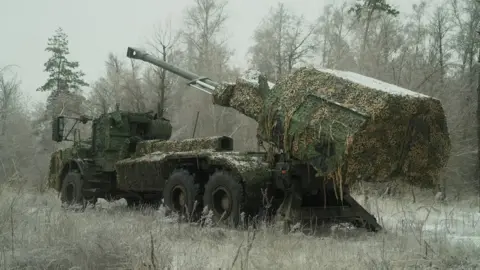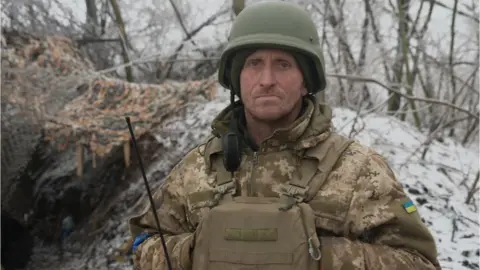Ukraine war: Kyiv forced to cut military operations as foreign aid dries up
 BBC
BBCUkraine has warned it is already being forced to downsize some military operations because of a drop-off in foreign aid.
Top general Oleksandr Tarnavskyi said troops faced ammunition shortages along the "entire front line", creating a "big problem" for Kyiv.
It comes as billions of dollars of US and EU aid have been held up amid political wrangles.
Ukraine said it hoped to boost its own ammunition industry with western help.
But it relies heavily on western supplies, particularly on deliveries of long-range missiles and air defence systems, to fight occupying Russian forces.
Gen Tarnavskyi told the Reuters news agency that the country lacked artillery shells, particularly for its Soviet-era weapons.
"The volumes we have are not sufficient, given our needs," he said. "So, we're redistributing it. We're re-planning tasks that we had set for ourselves and making them smaller because we need to provide for them."
He said that diminishing foreign military aid was already having an impact on the battlefield, and forcing a change in tactics.
"In some areas, we moved to defence, and in some we continue our offensive actions.
"And we are preparing our reserves for our further large-scale actions. Their intention remains. The only thing is that their actions change, tactics change."
His comments come in the wake of setbacks in both the EU and US. Republicans in the US Congress first blocked a $60bn (£47bn) military package for Ukraine earlier this month.
That was followed by Hungary's blocking of the EU's €50bn ($55bn; £43bn) financial aid deal last week. EU leaders however said Ukraine would not be left without support.
Ukraine was already facing an ammunition shortage as Western powers struggled to maintain supplies. The EU pledged to send one million artillery shells by March 2024, but so far only 480,000 have been either delivered or are in the pipeline.
Meanwhile, the US has provided Ukraine with more than two million 155mm shells for use in Western-made artillery systems. But its own stocks have been depleted, prompting the decision last summer to send cluster munitions.
Ukraine is already using ammunition faster than partners can produce it. A report by the Estonian defence ministry said Kyiv needed a minimum of 200,000 artillery shells a month to retain an edge against Russia.
"Sustaining this rate will empty European and US stockpiles over 2024 and will require significant foreign purchases of ammunition," it said.
Speaking to the BBC, Ukraine's Deputy Defence Minister Ivan Havryliuk said the country was ramping up production of kamikaze drones "to compensate [for] the lack of artillery shells".
Additionally, it was increasing its own production of artillery rounds "for almost the entire range" of its Soviet-era weapons.

He also said the country hoped to boost its defence industry by jointly producing ammunition with Western companies on Ukrainian soil.
Gen Havryliuk said this was the focus of negotiations with US companies when he accompanied President Volodymyr Zelensky during his December visit to the US.
Ukraine signed a number of agreements with US firms to start joint production.
He said that Ukraine could not match the resources of or manpower of Russia and the goal was to achieve technological superiority.
Gen Havryliuk said Kyiv was confident its international partners would overcome political differences to provide Ukraine with aid as before.
EU countries, he added, sent their assistance not only as a bloc but also on a bilateral level.
However, the situation has signalled to Russia that international support for Ukraine is weakening - and there are concerns that by switching its economy onto a war footing, Moscow can outlast the West in this battle of attrition.
Last week, Russian President Vladimir Putin reiterated his belief that the war would end only when Russia achieves its goals.
Kalle Kirss, the head of the Nato and EU department at Estonia's defence ministry, told the BBC that Europe needed to commit funding to support Ukraine.
"We need to signal very clearly to Russia that we're ready for a long war and that we will boost our industry and we [will] commit our resources."
